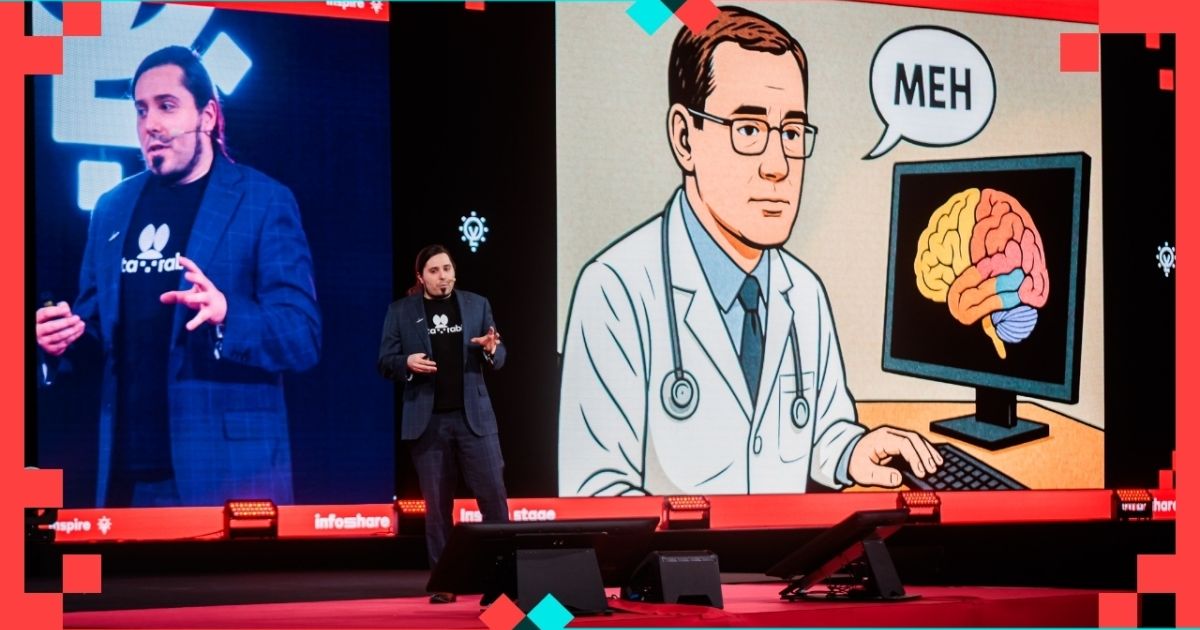VIEW SPEECH SUMMARY
- 15% of global GDP lost yearly due to healthcare inefficiencies (poor processes, late/missed diagnoses).
- Investing in healthcare development could increase global life expectancy from 73.5 to approximately 77 years by 2030.
- Current global shortage of 11 million healthcare specialists leads to long wait times, staff burnout, and suboptimal patient care.
- Example from Poland: severe shortage in neuroradiologists; many are near or past retirement age, worsening future staffing.
AI Opportunities in Healthcare
1. Enhancing Diagnosis:
- AI analyzes medical images (MRI, X-rays, CT scans) rapidly, often matching or exceeding human performance.
- Provides initial readings or flags urgent cases, reducing diagnostic delays.
2. Streamlining Workflows:
- Automates data extraction and reporting tasks (e.g., oncological registry submissions).
- Saves physician and nurse time, cutting costs and turnaround times significantly while improving data quality.
3. Patient Empowerment:
- Use of wearable devices and IoT to monitor health metrics easily accessible to patients.
- AI-powered symptom checkers and health apps (e.g., WebMD) offer health guidance, especially valuable in underserved regions.
4. Personalized Medicine:
- Large pharma companies use AI on big data to predict individual risks for diseases years in advance.
Challenges in AI Deployment
- Aligning AI solutions with actual clinical needs requires deep collaboration with healthcare professionals.
- Importance of user-centric design focusing on real doctor/patient problems to build trust and value.
- AI algorithms must be explainable due to existing skepticism among clinicians.
- Data acquisition is critical but complex: obtaining labeled medical data is difficult, requires compliance with strict regulations (HIPAA, GDPR, AI Act, medical device standards).
- Legal and regulatory burdens are significant; preparation for data collection can involve extensive paperwork (600+ pages mentioned).
- Integration with hospital systems poses technical challenges.
Actionable Items / Recommendations
- Prioritize patient and doctor needs when designing AI healthcare solutions.
- Engage deeply with healthcare providers to identify meaningful features (e.g., targeted aneurysm detection with shape and vessel analysis).
- Implement explainability features in AI to gain clinician trust.
- Start early on compliant, secure data acquisition for training algorithms.
- Prepare for extensive regulatory documentation and approval process.
- Leverage AI to reduce administrative burdens, enhancing time for patient care.
- Utilize wearables and patient data for empowering individuals and enabling preventive medicine.
- Consider collaboration opportunities and seek expert advice when developing healthcare AI projects.
Closing Notes
- AI has the potential to transform healthcare, making specialists more effective ("superhumans") and mitigating staff shortages.
- Motivations for AI in healthcare include mission-driven goals (e.g., extending life expectancy), personal reasons, and financial incentives.
- The speaker encourages innovators to pursue healthcare AI projects given the enormous potential and pressing needs.
- Open invitation for contact to discuss ideas or receive guidance.
When the Doctor Says ‘Beep’: Navigating AI’s Impact on the Future of Healthcare
17:25 - 17:45, 27th of May (Tuesday) 2025 / INSPIRE STAGE
Ever googled a symptom and convinced yourself it was something dire? Now imagine AI systems that can offer diagnoses before you hit that panic button plus credible enough so that they even help doctors in harder cases. As well as automate hospital workflows so doctors can focus on healing instead of paperwork. That’s not science fiction; it’s happening right now.
In this talk, we’ll explore how AI advancements are:
- Accelerating Diagnoses – Spotting diseases faster (and often more accurately) than traditional methods,
- Automating Operations – Slashing admin time and turning hospitals into efficiency hubs.
- Personalizing Treatment – Harnessing individual patient data so care plans aren’t one-size-fits-all
- Enabling Self-Diagnosis – Equipping everyday people with surprisingly powerful tools (without fueling hypochondria).
We’ll tackle the big questions: are AI-driven decisions trustworthy, and how to ensure that? Where do regulators draw the line? And will robots really replace doctors? Spoiler: AI isn’t a silver bullet – but it’s poised to transform healthcare for both professionals and patients. This talk will try to give a peek into the near future and what’s coming – and will stand in the way.



